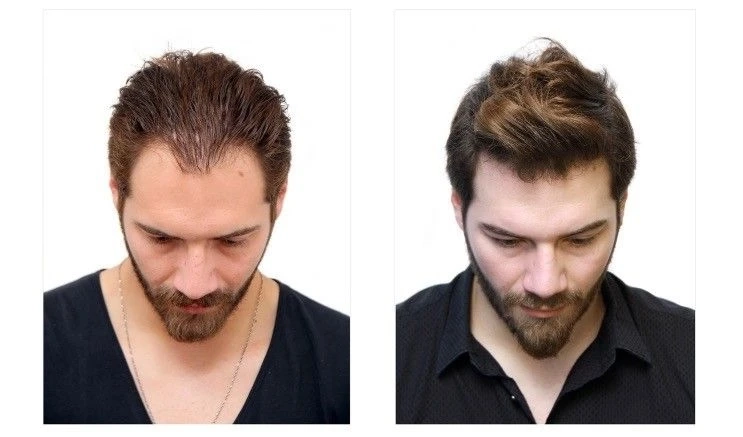Hair loss is a common occurrence in everyone's life and can be caused by various factors. It can be temporary or permanent depending on the underlying reasons. The main culprit for hair loss is often genetics, followed by hormonal changes, systemic diseases, and treatments like chemotherapy or radiotherapy. Additionally, poor nutrition, increased stress, pollution, and lifestyle changes can contribute to hair loss.
Experiencing hair loss can have a negative impact on one's mental well-being and overall quality of life. In today's world, appearance plays a significant role, and hair is an important aspect of one's aesthetic personality. It is often the first thing people notice at eye level, making it crucial to find a solution for regrowing hair.
Hair transplant surgery has emerged as the leading solution for permanent and undetectable hair loss treatment. In the past, the results of hair transplant surgery were not as aesthetically pleasing, with unnatural-looking and fake hair plugs. However, recent advancements have greatly improved the procedure, resulting in more natural outcomes.
What is hair transplant?
Hair transplantation is a medical procedure that involves transferring hair follicles from a selected donor area to the recipient area. It is important to note that this procedure is often misunderstood as a regenerative treatment that can bring back lost hair follicles. In reality, hair transplantation is a purely restorative procedure that aims to provide maximum coverage to the bald area by shifting hair follicles from the donor area to the recipient area. This cosmetic procedure is a life-changing solution for individuals experiencing hair loss, as it offers them a second chance to regrow their hair in the bald area.
Hair transplantation is sometimes mistakenly believed to be able to fully restore complete baldness to its previous state. However, the truth is that hair transplant procedures can only replace around 30% of the hair follicles, which still yields satisfactory results. This limitation exists because each hair follicle requires its own individual supply of nutrition, and it is not possible to provide this individual blood supply to all hair follicles, thus hindering complete restoration.
The residents of Bangalore are currently facing an increasing incidence of hair loss, primarily due to contamination of the water supply and inadequate water availability. Additionally, the city is experiencing a rise in pollution levels due to the destruction of green belt areas for commercialization purposes. It is worth noting that hair transplant cost in Bangalore is quite expensive and not as advanced as those available in Delhi. Fortunately, Delhi is home to a few world-renowned hair transplant surgeons who are known for delivering exceptional results at an affordable cost. So if you are searching for the hair transplant in Bangalore, you can look for a better option in Delhi or Jaipur.
Basics about hair transplant
The hair transplant procedure is an elective procedure that individuals choose for themselves at different stages of hair loss. The treatment plan for each patient varies depending on the extent of baldness and their current situation. This procedure involves extracting hair grafts from donor areas and transplanting them to the desired bald areas. Only your own hair is used in this procedure, as hair from any other source may be rejected. The donor area is carefully selected based on the presence of permanent or DHT-resistant hair roots. The most common donor areas are the back and sides of the head, as well as body hairs. These donor areas are carefully examined to ensure an adequate amount of hair follicles can be harvested without causing any depletion in density at the donor site.
Once the feasibility of a hair transplant has been confirmed, a thorough assessment of the scalp is conducted during the initial consultation to ensure comprehensive planning of the procedure. Various important factors are considered during this consultation, including:
Determining the donor area for hair transplantation.Assessing the extent of baldness and determining the number of hair grafts required.Discussing the cost of the procedure.Setting realistic expectations for the outcome of the hair transplant.Explaining the techniques used to perform the hair transplantation.It is important to note that there are several myths surrounding the hair transplant procedure, which may be misleading. Therefore, it is crucial for every patient to be well-informed about the advantages and disadvantages of the procedure before making any decisions.
How to find the best hair transplant surgeon?
The question arises as to what criteria should be used to find the best hair transplant surgeon, and this will be addressed in the following section.
Opt for a highly qualified surgeon: The most crucial aspect to consider is the qualification of the surgeon, which should include specialized training in cosmetic surgery and an authorized certification from relevant boards.Select an experienced surgeon: It is essential to assess the surgeon's experience, as this indicates their level of expertise and reputation. Take into account the number of hair transplants they have performed.Evaluate expertise and skills: Ensure the surgeon's expertise and skills by reviewing pictures and videos of previous patients. Videos are particularly reliable as they offer limited opportunities for editing, allowing you to place trust in them.Beware of falling for discounts: While cheaper options may seem tempting, the end results could be disastrous. Exercise caution when selecting a surgeon, as hair transplant is a permanent treatment with no going back once it is done. Focus on finding the best surgeon first, and then consider budget options from reputable clinics.

